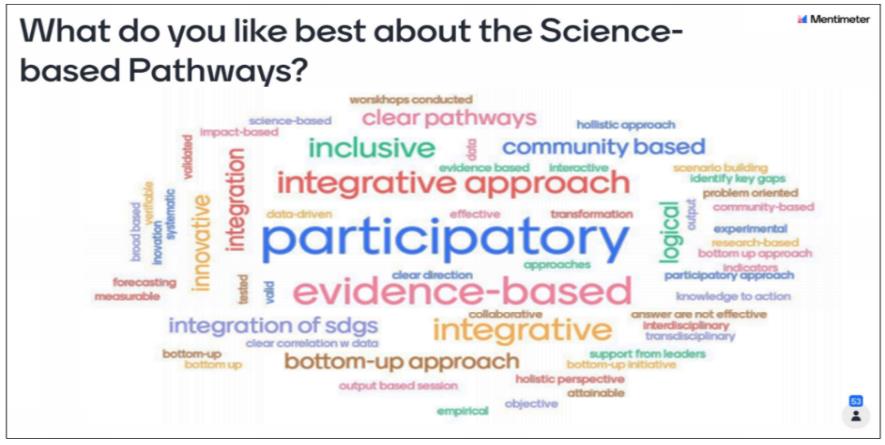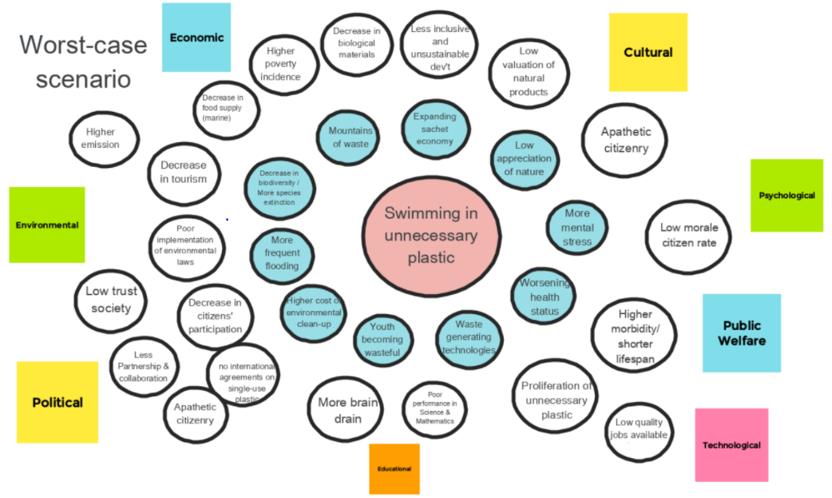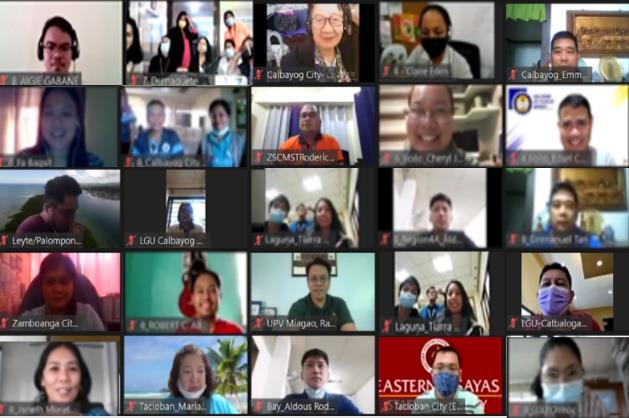Promoting the Science-Based Pathways to Sustainability in the Philippines
Future Earth Philippines Program (FEPP) recently conducted three webinar-workshops to promote awareness of the Sustainable Development Goals (SDGs) and to provide participants with an introduction to the Science-Based Pathways to Sustainability (SBPS) Initiative, a global initiative led by Future Earth. The three events discussed around the topics of SDG Futures, Pathways, and Initiatives; Scenarios and Implications; and Community Mobilization, respectively. The three workshops were conducted with the following objectives:
- To provide an orientation to the objectives, organization, processes and outputs of the exploratory phase of Future Earth Philippines;
- To provide an orientation on science-based pathways, and foresighting and backcasting approaches to achieving the SDGs at city and community levels;
- To initiate a listing and clustering of national and local SDG-attentive experts and practitioners into workshop groups to do future scenarios and identify knowledge-into-action initiatives; and
- To start a continuing cross-level (national, regional, and local) and cross-disciplinary conversation between members of the NAST community with a foresighting focus and the FEP community with a knowledge-to-action focus.
The first two events were conducted along a national perspective whereas the third event served as a pilot activity for bringing the discussions and problem-solving exercise to the local community levels.
These events were organized in partnership with the National Academy of Science and Technology (DOST-NAST), the National Research Council of the Philippines (DOST-NRCP), and the Ateneo de Manila University (ADMU), and supported by the Regional Center for Future Earth Asia based in the Research Institute for Humanity and Nature in Kyoto, Japan.
Following are brief overview of each workshop and future plans for the Science-Based Pathways to Sustainability initiatives in the Philippines.
National Future Earth Workshop (Part 1) on SDGs Futures, Pathways, and Initiatives
National Workshop Part 1 was held on December 16-17, 2020 in the form of a webinar and online workshop, attended by 185 national and local SDG-attentive experts and practitioners in the Philippines.
The first session of the Workshop included introductory lectures on sustainability and the Science-Based Pathways Initiative to attaining the SDGs and an orientation to the Future Earth Philippines Program (FEPP). Dr. Lourdes J Cruz of DOST-NAST and the FEPP Leader described the unsustainable situation of the Philippines considering the country’s low biocapacity relative to its ecological footprint per capita. She revealed that the UN 2020 Sustainable Development Report gave the Philippines a low overall score with the country being on track only for SDG 1 on Poverty and SDG 13 on Climate Action. She continued that this has necessitated the development of Future Earth Philippines as a nation-wide platform for science-based policy recommendations and collaborative development of knowledge-to-action programs for sustainability and resilience, as well as a country-wide approach.

In the Workshop Part 1, about 100 participants proceeded to the 10 breakout sessions to discuss the cluster topics on Marine & Coastal Ecosystems; Fresh Water Supply; Sustainable Cities and Communities; Terrestrial Environment & Biodiversity; Climate Change, Disasters, & Hazards; Land System Change & Food Security; Public Health; Education, Capability Building & Advocacy; Sustainable Consumption & Production; and Plastic Wastes. Each group created a SWOT matrix relevant to its thematic concerns, grouped the elements according to the level of certainty, then identified drivers to formulate cluster scenarios. The SWOT analysis by the Clusters was used as the basis for listing the drivers of change. Two orthogonal drivers were then chosen to formulate a scenario matrix and identify the best- and worst-case scenarios.
National Future Earth Workshop (Part 2) on Scenarios and Implications
As a sequel to the first workshop in December 2020, the National Future Earth Workshop Part 2 on Scenarios and Implications was held on 21 January 2021 to review the processes and outputs of the National Workshop, Part 1; to review the drivers and refine the scenario matrices; and to examine the potential implications of chosen scenarios and discuss the inter-scenario synergies, dilemmas, and trade-offs.
There were 88 participants, of which 44 came from different Academic Institutions, 36 are from the Government Agencies, 5 are from Civil Society groups while 3 are from Industry/Business sectors.
To start the Workshop, NAST President Dr. Rhodora V. Azanza reminded everyone of the following important points: 1) SDG indicators are interrelated and interactive with the biosphere/ environment as the bedrock for sustainability and productivity of the society and its economy; 2) Multidisciplinary and transdisciplinary science-based approach and systems analysis should consider the society’s values and preferences; and 3) Sustainable production and consumption (SCP), environmental protection, and circular economy should be major components of the adaptive plans for the future.
After a review of the initial scenario matrices identified at the December 2020 National Workshop, participants were divided into five Clusters: Sustainable Consumption and Production, Marine and Coastal Ecosystems, Population Health, Land Systems Change, Food Security, and Plastic Waste, where they analyzed the implications of the selected scenarios (worst and/or best scenarios) on political, economic, sociocultural, technological, legal, and ecological factors (PESTLE) and developed the Implication Wheel for their selected scenarios.

Future Earth Philippines Workshop on Community Mobilization
The Visayas Regional Future Earth Community Mobilization Workshop was conducted on 23-24 February 2021 via Zoom with the theme, “Resilience and Sustainability Concerns in View of the COVID-19 Impact on Health, Food, Security, and Mobility”. The aims of the workshop were to help facilitate the transition of municipalities and cities toward sustainable development and to provide training to local government officials/staff members to assess the status of development in their city or municipality and draft strategies to facilitate their transition toward sustainability. The Workshop brought together 212 participants including representatives from the local government offices, academe, business sector, and civil society.
In this program, the concept and importance of sustainability was first introduced. After lectures on SDGs-related activities in the region, participants discussed SDGs-related activities in their municipalities, conducted a problem tree analysis on a selected municipality, and gained experience in analyzing logical frameworks for designing projects that can be implemented by the cities and municipalities involved.

Overview and future steps
For the workshop sessions, Dr. Segundo E. Romero Jr., of Ateneo de Manila University designed and implemented systematic ways of assessing organizational strengths and weaknesses, diagnosing SDG-oriented problems, foresighting alternative futures, anticipating the implications of these futures on the SDGs, exploring the cross-SDG trade-offs and dilemmas and formulating local community SDG initiatives.
The apps for online activities (Zoom, Mentimeter, Jamboard, and Mural), allowed increased participation in simultaneous group sessions, facilitated documentation, and useful scaffolding for stepwise progression towards the desired group outputs. The online templates and apps were novel for many participants and encouraged them to participate actively with a visual representation and record of that participation. The online format of the webinar-workshops allowed the participation of interested individuals from all over the archipelago, which would have been impossible to do for those with limited budget for face-to-face activities.
The lectures exposed the participants to new concepts and insights and the workshop sessions further generated a lot of ideas, insights, and initiatives. For better understanding, the collection of ideas were organized into five categories, namely: the Mission Perspective, the Stakeholder Perspective, the Resources (Finance) Perspective, the Methods (Core Business Process) Perspective, and the Capacitation (Learning and Growth) Perspective. The organized set of ideas can now be used to formulate a science-based SDG pathways strategy that could enhance the performance of the Philippines in attaining its SDG targets by 2030.
DATE
May 6, 2021AUTHOR
Future Earth Staff MemberSHARE WITH YOUR NETWORK
RELATED POSTS
Future Earth Philippines Program launched in Manila
